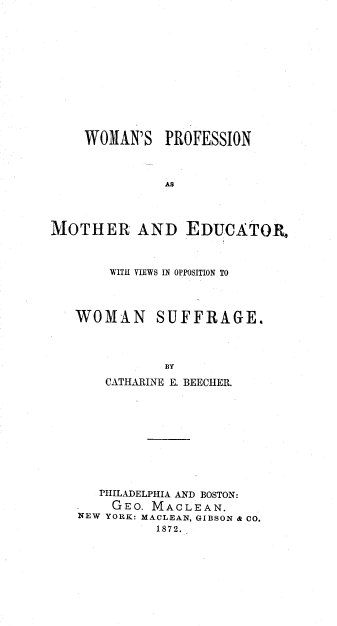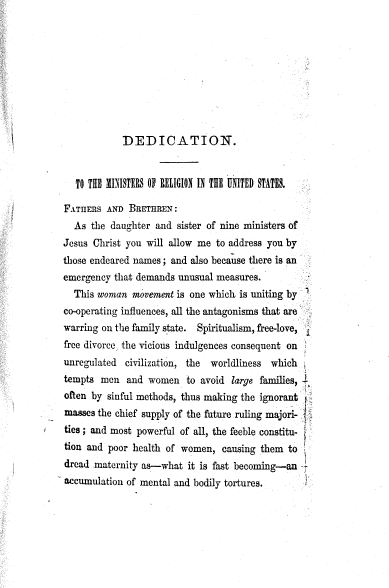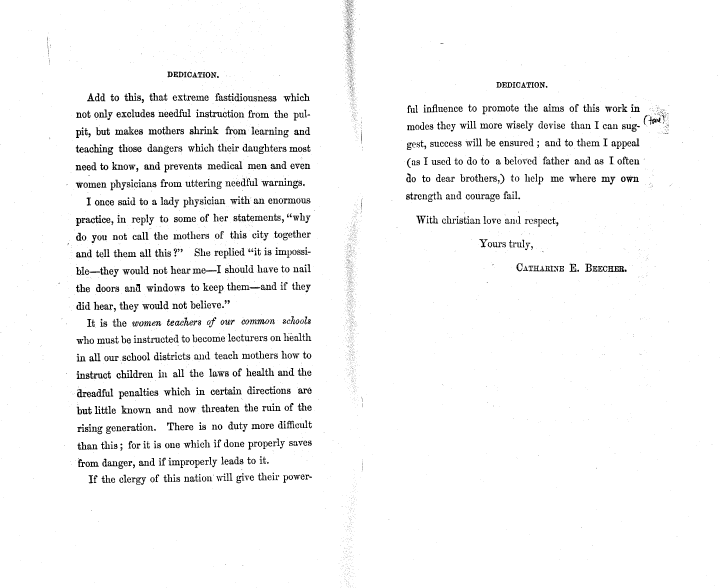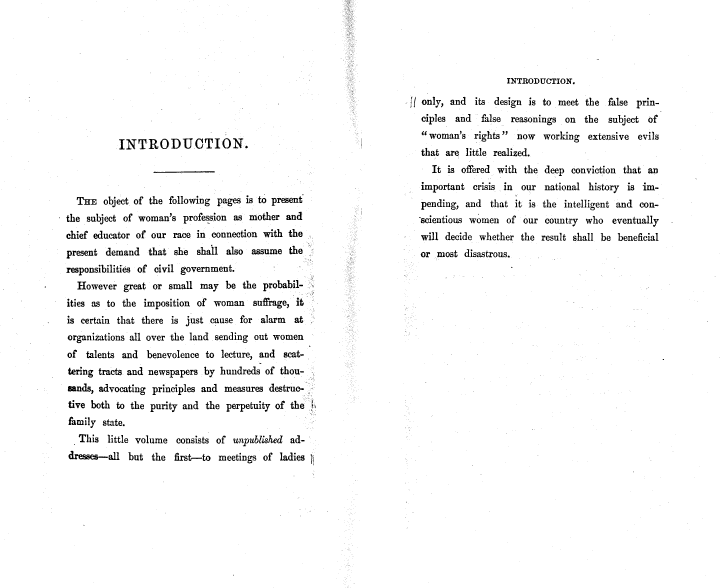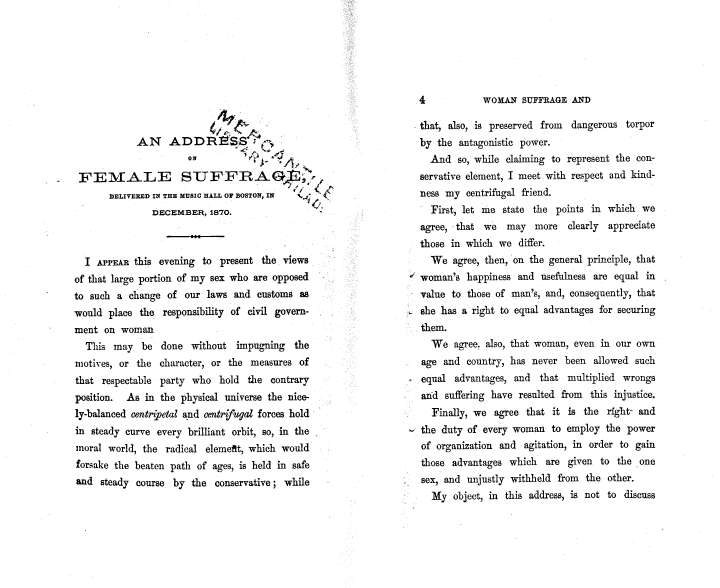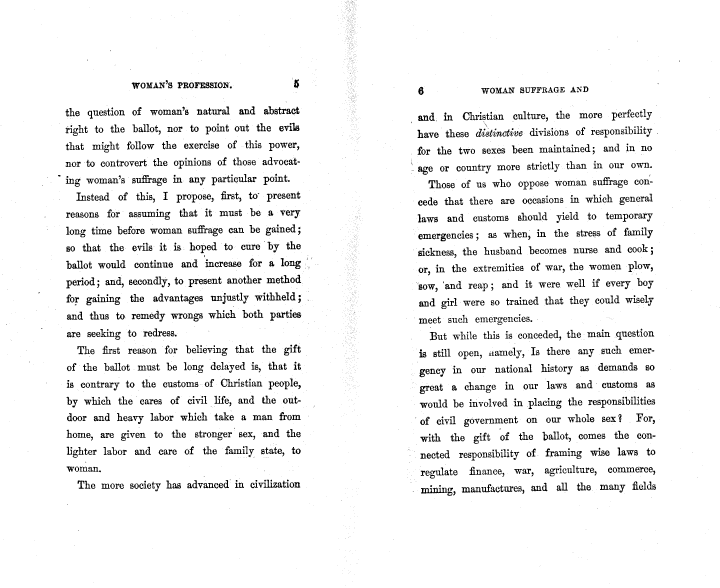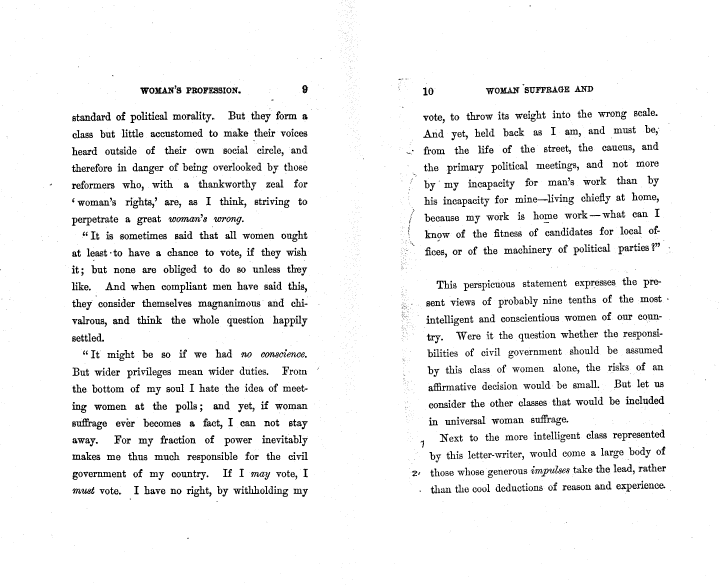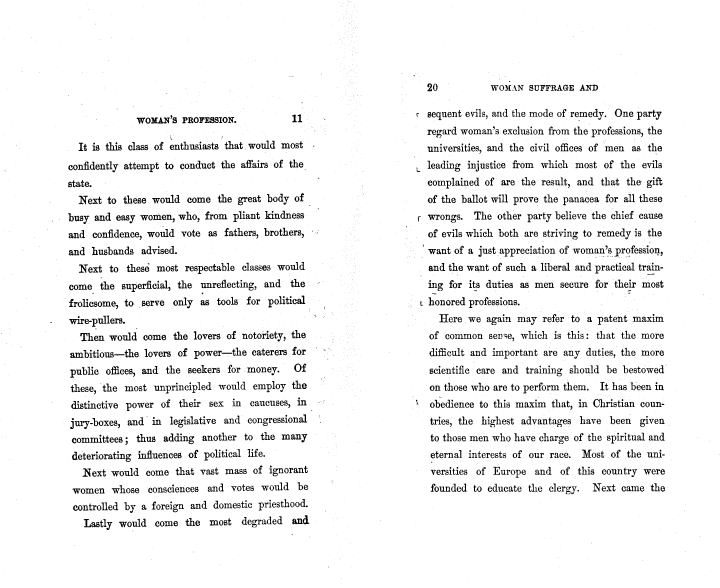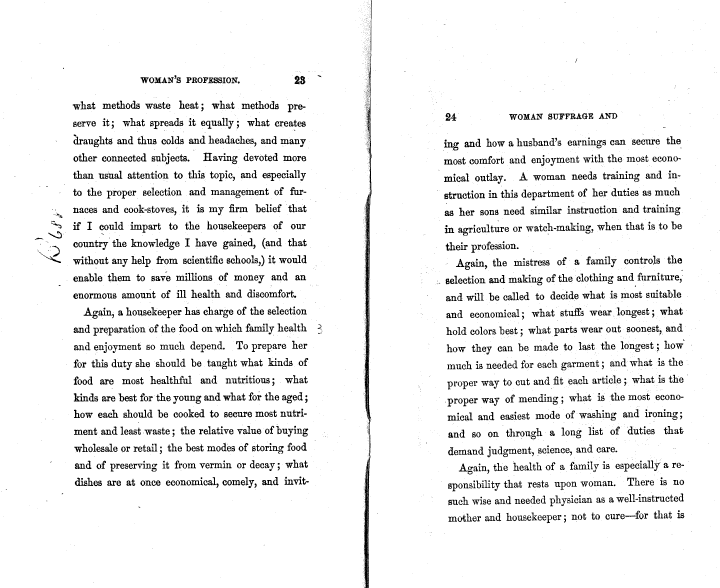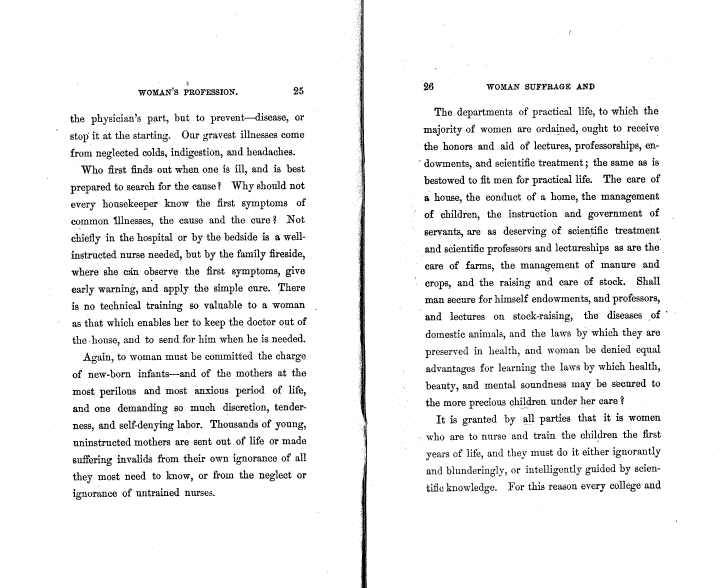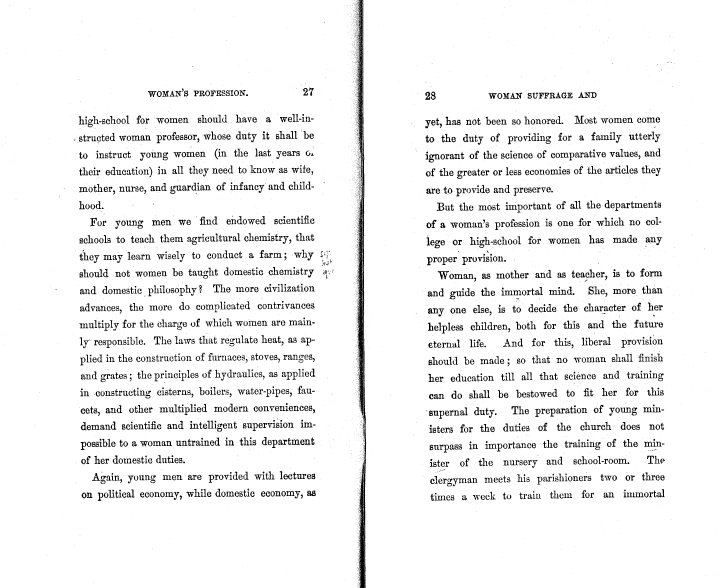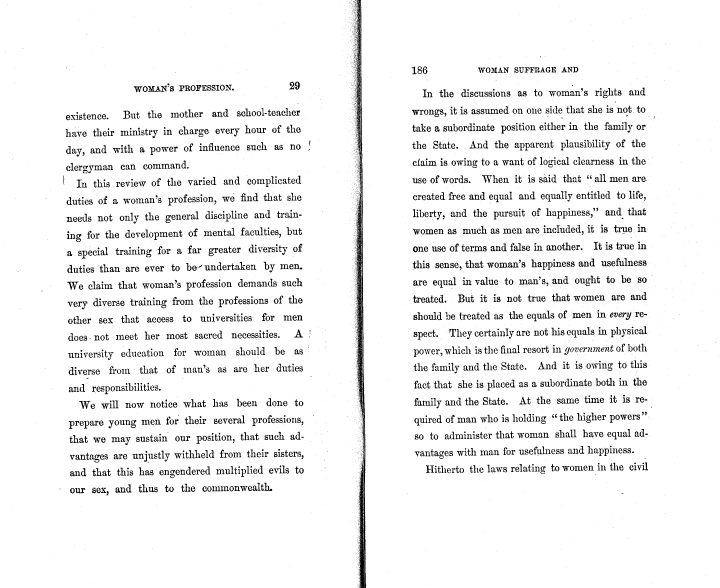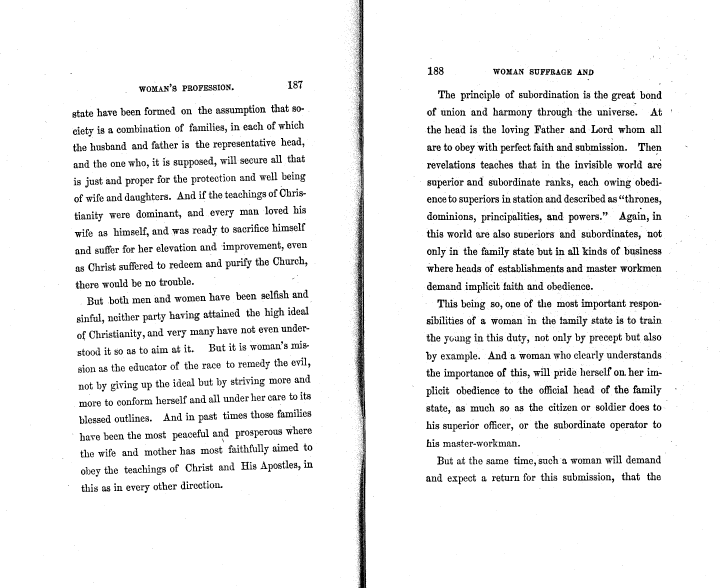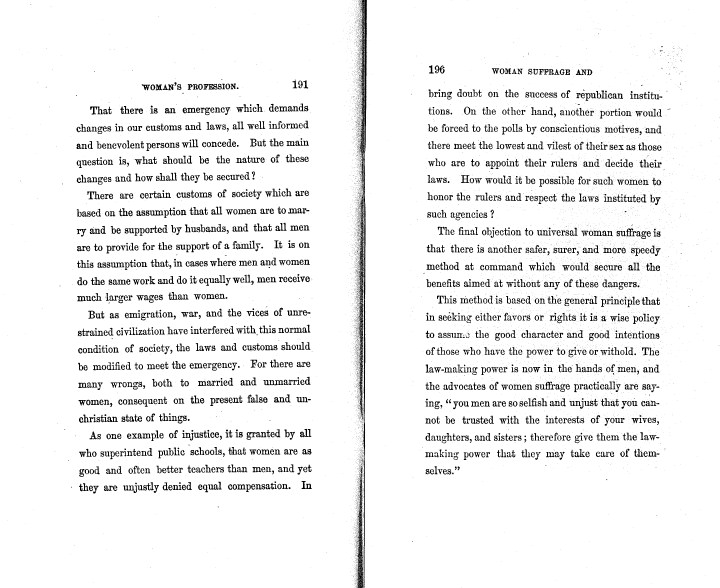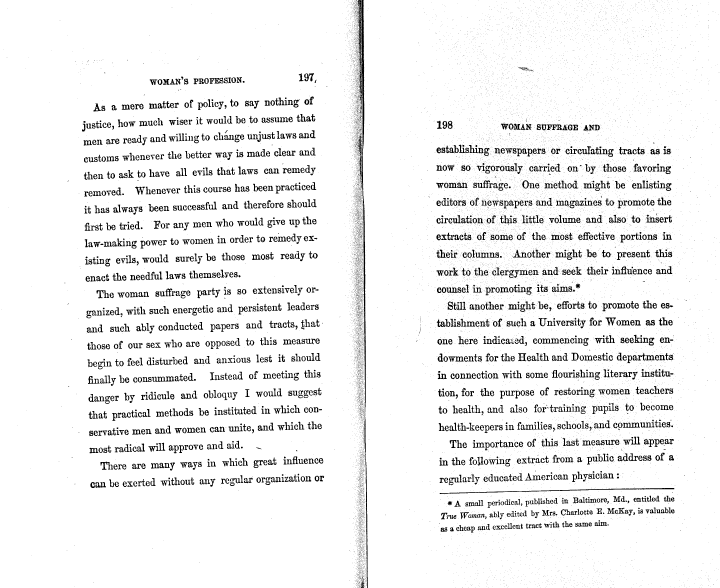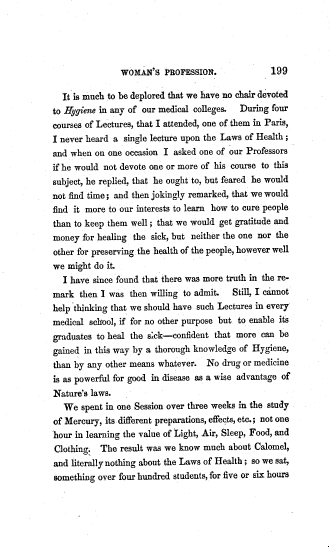|
Catharine Beecher |

|
I like to think that the greatest achievement of my life is my book A Treatise on Domestic Economy for the Use of Young Ladies at Home and at School. Since I first had this published in 1841 it has been through several printings and continues to sell better than any of my other works. Of course, its popularity flatters me, but it is when I think of the good that this book can do to help women better to control their lives that I measure the value of this work. This aim, finding a way for the modern woman to take charge of her own world, has been the principal directive force of my already long life.
I was born on September 6, 1800 at East Hampton on Long Island, where my father, the Rev. Lyman Beecher, was pastor of the Congregational Church. As you probably know, he became one of the great leaders of the Protestant faith in America, delivering sermons that were frequently published to inspire a wider audience than his own congregation. And yet, it is very important to me that you understand that my mother, brief though her time on this earth was, was no less significant in her accomplishments. She was remarkable not only for her intelligence and culture, but for a natural taste and skill in domestic handicraft, and it was from her that I acquired those fundamental sentiments toward the place of women in the world that have guided me ever since. When she died in 1816, while we were living in Litchfield, I made every effort to take her place at home, raising our young and large family (of which I was the eldest), and instilling in them those traits they would need for the world they would enter.
After my father remarried I taught school for a short time at New London, all the while studying and enlarging my knowledge in various fields, including mathematics, Latin and philosophy. These fields, I realize, are normally the domain of man, but nonetheless I have always thought they are worthwhile for females as well. I was engaged to be married to Professor Alexander Fisher of Yale College, and fully ready to enter married life as an equally contributing partner as had my mother, when death took him from me in 1823. I was shaken and depressed for some time, but eventually realized that I could still find happiness by resolving to devote my life to doing some good for others.
In 1824 I opened a private school, the Hartford Female Seminary, which soon became very successful, being known for its excellence of teaching and the great opportunities its curriculum offered for young women usually confined to learning drawing and music. I went with my father's family to Cincinnati when he became president of Lane Theological Seminary, and I opened a school there as well, hoping to continue to spread exciting new educational opportunities for women across the country. Fortune did not smile on this venture, however, and during the hard times after 1837 I had to give up the school. Undaunted, I continued to work for improved opportunities for women as students and as teachers during the next few years. I also sought out the advice of my friend Lydia Sigourney of Hartford and of my sister Harriet in regard to establishing a career as a writer, although I cannot say I benefited a great deal from it - at least not until 1841 when my Treatise on Domestic Economy was published. It was then that I truly began to increase my sphere of usefulness.
It was my hope, with this work, to encourage women to take hold of their lives in these changing times and to recognize the true value of their work. Women's lives in America have changed considerably since I was a young girl, and those changes were clearly evident in the 1840's. I had repeatedly heard mothers say that they had wept tears of bitterness over their infant daughters, at the thought of the sufferings which they were destined to undergo; while they cherished the decided wish, that these daughters should never marry. The emergence of these sentiments, that women in this day and age were nothing but mere domestic slaves, disturbed me greatly, and I set about to suggest an alternative.
I urged women, above all, to be systematic. That is, I told them to set their priorities clearly, to allow sufficient time for work they considered most important, to make their decisions rationally and carefully, and in so doing, to serve as a model for responsible citizenship for their children. In the first chapter I wrote,
The success of democratic institutions, as is conceded by all, depends upon the intellectual and moral character of the mass of the people. If they are intelligent and virtuous, democracy is a blessing; but if they are ignorant and wicked, it is only a curse....It is equally conceded, that the formation of the moral and intellectual character of the young is committed mainly to the female hand.
It seemed to me that women had a special mission. Of course, I realized that in this country they did not yet have the resources, that is the special training they needed, to carry out this mission successfully, but I hoped that my book and my humble efforts in establishing endowed institutions of higher education for women would help.
As housekeepers and mothers women need to learn to exercise quickness of perception, steadiness of purpose, regularity of system and perseverance in action. This means they will have to be trained in the formation of habits of investigation, of correct reasoning, of persevering attention, of regular system, of accurate analysis, and of vigorous mental action. While woman may hold a subordinate relation in society to the other sex, it is not because it was designed that her duties or her influence should be any the less important, or all-pervading. With these views in mind, I wrote chapter after chapter on various aspects of domestic life, explaining ways in which these elements of woman's responsibilities could be developed into a systematic approach under her own control.
Although some may express some surprise at the fact that I, an unmarried woman with an independent income, should be in any position to advise married women on their outlook on marriage, I would argue that it is from my advantaged position of being on the outside of marriage looking in that I am able to have the objectivity to see the solution to problems from which so many women suffer. I am not a supporter of voting rights for women, for I feel that American women, as wives, mothers, and as contributors to the moral well-being of society, have far more important work to do in their own sphere.
I have told my sister Isabella, the founder of the Connecticut Woman Suffrage Association, of these views on woman suffrage. Even so, she insisted I come to her convention in 1869, and then mistakenly listed me as a member of her organization. In response I have written at length, even though long since retired from an active career, discussing the distinction I see in regard to the suffrage. I shall attempt to explain the matter to her again, although I fear I shall not live to see the day my younger sister admits that my solution to the woman question is not the same as hers.
It does please me, however, to have lived long enough to see the day when the work I have done has actually had an effect upon the independence of women in the home as leaders of their families' spiritual and moral well-being (thus of the nation's spiritual and moral well-being). I seriously doubt the suffrage could achieve that, and I suspect it could work the opposite effect in the end.

